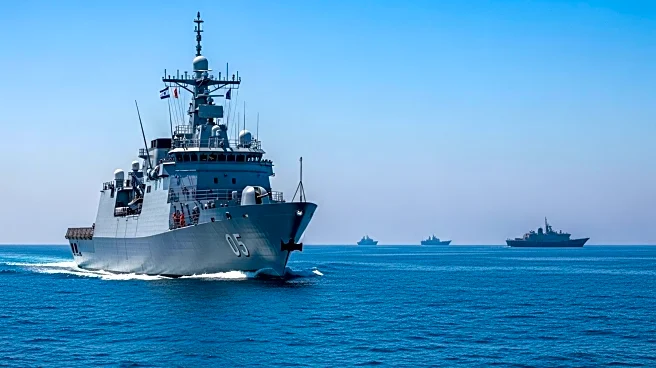What's Happening?
Israeli forces have intercepted 13 boats from the Global Sumud Flotilla, which were carrying foreign activists and aid intended for Gaza. Despite this, 30 boats continue their journey towards the Palestinian enclave. The flotilla, consisting of over 40 civilian boats with approximately 500 parliamentarians, lawyers, and activists, aims to deliver medicine and food to Gaza. The Israeli foreign ministry confirmed that the passengers, including Swedish climate campaigner Greta Thunberg, are safe and healthy. The interception has sparked international reactions, with Turkey labeling the action as an 'act of terror' and protests erupting in Italy. The flotilla's organizers have condemned the raid as a 'war crime,' citing aggressive tactics used by the Israeli military, although no injuries were reported. The flotilla's progress has attracted global attention, with countries like Turkey, Spain, and Italy preparing to assist their nationals if needed.
Why It's Important?
The interception of the flotilla highlights ongoing tensions surrounding the Israeli blockade of Gaza, which has been a point of contention for years. The blockade is intended to prevent the delivery of supplies to Hamas militants, but it also restricts humanitarian aid to civilians in the region. The international response underscores the complex geopolitical dynamics, with countries like Turkey and Spain advocating for the safety and rights of the activists. The incident may further strain Israel's diplomatic relations with these nations, potentially impacting future negotiations and peace efforts in the region. The flotilla's mission draws attention to the humanitarian crisis in Gaza, emphasizing the need for international dialogue and intervention to address the plight of civilians affected by the conflict.
What's Next?
The flotilla's organizers remain determined to continue their mission, despite the interception. Israel has offered to transfer aid through safe channels, but the flotilla has rejected this proposal, insisting on direct delivery. The situation may lead to further diplomatic discussions, as countries involved in the flotilla seek to negotiate the release of their nationals and ensure the safe passage of aid. The ongoing blockade and military actions could provoke additional international protests and calls for policy changes. The incident may also influence future humanitarian missions and strategies for delivering aid to conflict zones.
Beyond the Headlines
The interception of the flotilla raises ethical questions about the balance between security measures and humanitarian needs. The use of military force against civilian vessels carrying aid challenges international norms and may prompt legal scrutiny. The event highlights the broader issue of access to humanitarian aid in conflict zones, where political and military interests often overshadow the needs of vulnerable populations. The flotilla's mission serves as a reminder of the persistent humanitarian crisis in Gaza, urging global leaders to consider more effective and compassionate approaches to conflict resolution and aid distribution.










